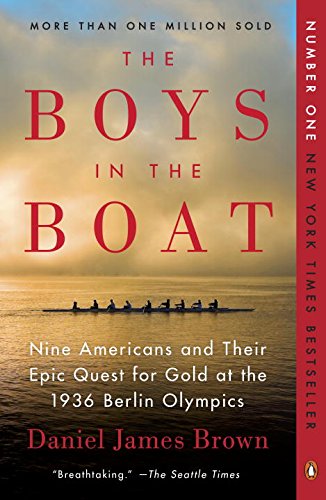
All along Joe Rantz had figured that he was the wake link in the crew. He'd been added to the boat last, he'd often struggled to master the technical side of the sport, and he still tended to row erratically. But what Joe didn't yet know--what he wouldn't, in fact fully realize until much later, when he and the other boys were becoming old men--was that every boy in the boat felt exactly the same that summer. Every one of them believed he was simply lucky to be rowing in the boat, that he didn't really measure up to the obvious greatness of the other boys, and that he might fail the others at any moment. Every one of them was fiercely determined not to let that happen. [p. 326]THE BOYS IN THE BOAT: Nine Americans and Their Epic Quest for Gold at the 1936 Berlin Olympics sets its sights high on the cover with what in many cases would be an overblown phrase: "Epic Quest". It begins small, with the author's meeting with a dying Joe Rantz in the prologue, followed by other small introductions, to the rowing program at the University of Washington in Seattle, the Seattle sports reporter who wanted his city to take a higher place in public opinion, the men who worked for the program, the boys seeking a place on the freshman rowing team in the fall of 1933, and the goings-on in Germany, where Hitler was secretly building weapons and overtly building an enormous new stadium for the 1936 Olympics.
That autumn, 175 freshmen at Washington turned out, each seeking one of only nine positions on the freshman crew team.
The trick would be to find which few of them had the potential for raw power, the nearly super-human stamina, the indomitable willpower, and the intellectual capacity necessary to mast the details of the technique. And which of them, coupled improbably with all those other qualities, had the most important one: the ability to disregard his own ambitions, to throw his ego over the gunwales, to leave it swirling in the wake of his shell, and to pull, not just for himself, not just for glory, but for the other boys in the boat. [p. 23]While the book is quick to describe the picturesque and the challenge and the glory of racing, it is equally anxious to make clear that crew racing is extremely difficult. As a reporter for the Seattle Post-Intelligencer, Royal Brougham, noted in 1933, "Neighbor, it's no game for a softy." Pages are dedicated to explaining the mechanics of the sport, along with details about which muscle groups are used, how much oxygen is required to power a race, and more. That the author chose to position that information toward the front of the book makes a reader sit up and take notice, automatically generating respect for these college boys as they learn to row and find their places in the boat and ultimately, in history.
Nothing comes easy - not the rowing itself, and certainly not their victory in Berlin in 1936. Don Hume, When it became clear that the U.S. team was going for the gold, the team's coach was shocked to learn that the German Olympic Committee (headed by the German rowing committee)and the Fédération Internationale des Sociétés d'Aviron (headed by an Italian-Swiss man) had conspired to assign lanes for the gold-medal race using their own criteria. Rather than the fastest qualifiers garnering pole position (more or less), the fastest teams - including Great Britain and the United States - were consigned to the farthest, least-beneficial lanes.
"It's a great art, is rowing. It's the finest art there is. It's a symphony of motion. And when you're rowing well, why it's nearing perfection. And when you near perfection, you're touching the Divine." -- George Yeoman Pocock (quoted as an epigraph).
This book manages to near perfection as well. I'm indebted to my extended family for sending it my way. I should note that this book is in development to be a movie directed by Peter Berg.

No comments :
Post a Comment